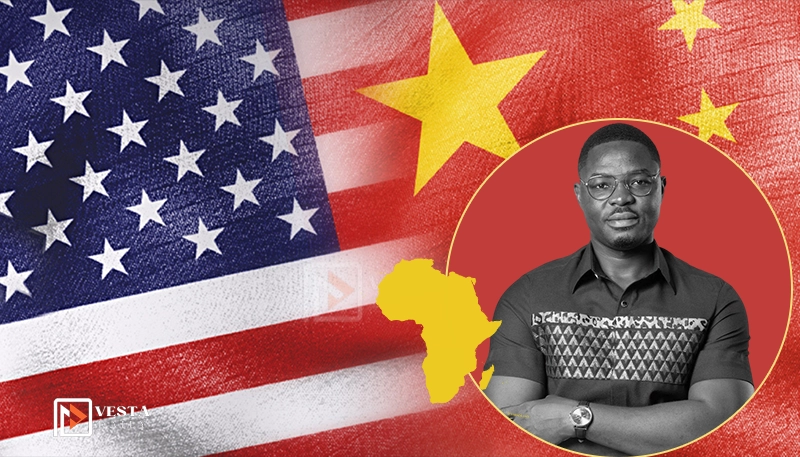How the US-China Trade War Will Reshape African Economies: A Critical Analysis
African Markets Brace for Disruptive Chinese Import Surge Amid Global Trade Tensions
The intensifying trade war between the United States and China is poised to create significant ripple effects across African economies in ways that many business leaders and policymakers may not fully anticipate. As China seeks alternative markets for goods rejected by American tariffs, African nations face a complex set of economic challenges that could reshape trade dynamics across the continent.
What begins as seemingly beneficial price reductions could quickly evolve into serious economic distortions with long-lasting consequences for local industries and currency stability.
Immediate Impact: The Chinese Export Flood
The first and most visible effect will likely be a substantial influx of Chinese goods entering African markets. With Chinese exporters seeking to offload inventory originally destined for American consumers, Africa represents an appealing alternative market. This redirection of trade flows will create:
- An immediate glut of Chinese products across multiple sectors
- Significant price reductions as supply outpaces demand
- Intensified competition for local manufacturers
According to the African Development Bank, many African manufacturing sectors already operate on thin margins, with relatively high production costs compared to Asian competitors. The anticipated price advantages that Chinese imports will enjoy could potentially devastate vulnerable local industries unable to match these artificially lowered prices.
Global Recession Threat Accelerates Timeline for Economic Distress
The secondary effects of the trade war extend beyond simple market disruption. Economic analysts at institutions like the International Monetary Fund have warned that continued trade tensions between the world’s largest economies could trigger a global recession at an accelerated pace.
This creates a particularly dangerous scenario for African economies:
- Initial price advantages prove temporary – Any short-term benefits from cheaper imports will quickly evaporate as global demand contracts
- World trade patterns face multi-year distortion – Normal trade flows will remain disrupted for approximately three years
- Economic orthodoxy gives way to political imperatives – Standard economic principles will be subordinated to politically motivated policies and ideological considerations
China’s Strategic Currency Maneuvers
Perhaps most concerning for African economic stability is China’s apparent strategy regarding currency and dollar reserves. Reports indicate that China has begun withdrawing USD purchases through its major banking institutions, a move that signals a potential shift in global currency dynamics.
Further, Chinese monetary authorities may implement a deliberate devaluation of the yuan to protect export competitiveness, creating additional pressures on trading partners. If other major economies adopt similar defensive postures, the resulting currency instability could force the United States to reconsider its hardline approach.
However, as noted by foreign policy analysts, the current U.S. administration’s negotiating style suggests compromise may prove elusive, extending the period of global trade uncertainty.
African Import-Dependent Nations Face Heightened Vulnerability
For nations like Ghana and other import-dependent African economies, these developments create a perfect storm of economic challenges:
- Increased tariffs will slow export growth, reducing critical foreign exchange earnings
- Continued reliance on USD for international trade will strain already limited reserves
- Currency depreciation becomes increasingly likely as dollar demand outpaces supply
- Local businesses face paradoxical price pressures – cheaper imports but more expensive industrial inputs
The World Bank’s Africa Pulse report has consistently highlighted how currency volatility disproportionately impacts African economies due to their position in global supply chains and commodity markets.
Strategic Positioning for African Businesses
Despite the challenging outlook, certain business strategies may prove effective for navigating the turbulent trade environment:
- Companies with secured contracts and non-perishable inventory could benefit from price fluctuations
- Businesses with substantial warehousing capacity can stockpile goods during favorable price windows
- Firms able to rapidly pivot between suppliers and markets may find competitive advantages
According to trade specialists at the African Export-Import Bank, agility and diverse supplier relationships will prove crucial during this period of heightened uncertainty.
Preparing Your Business for Trade War Fallout
As these complex global dynamics unfold, African businesses and policymakers must develop proactive strategies rather than reactive responses. Consider these critical steps:
Diversify supply chains beyond traditional partners to reduce dependency on single markets. This strategic shift will create resilience against disruptions in any single region and provide negotiating leverage with existing suppliers.
Evaluate currency exposure and implement appropriate hedging strategies. Currency fluctuations can significantly impact profitability, making it essential to develop financial safeguards against volatile exchange rates through careful risk management.
Identify potential competitive threats from redistributed Chinese exports in your sector. As trade patterns shift, markets may experience influxes of products previously destined for other regions, potentially disrupting local competitive landscapes.
Explore regional trade opportunities within African markets that may be less disrupted. The African Continental Free Trade Area presents significant potential for intra-regional commerce that could be more stable than reliance on distant international partners.
Monitor policy developments closely as political rather than economic factors will drive outcomes. In this environment, regulatory decisions and diplomatic relationships will shape market access and trade terms more powerfully than traditional economic forces.
Expert Consultation Is Essential
The observations shared in this analysis reflect developing trends based on current trade war developments and U.S. tariff policies. While they provide valuable context, they should be supplemented with professional guidance specific to your business circumstances.



